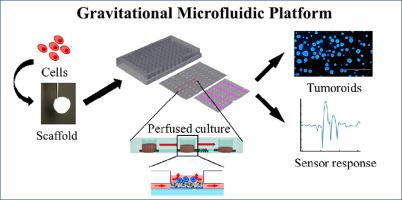Nanomedicine: Nanotechnology, Biology and Medicine ( IF 5.4 ) Pub Date : 2020-08-26 , DOI: 10.1016/j.nano.2020.102294 Tao Wang 1 , Ryan Green 2 , Mark Howell 2 , Taylor Martinez 2 , Rinku Dutta 3 , Subhra Mohapatra 3 , Shyam S Mohapatra 1

|
The tumor microenvironment plays a critical role in tumor initiation, progression, metastasis, and drug resistance. However, models recapitulating the complex 3D structure, heterogeneous cell environment, and cell-cell interactions found in vivo are lacking. Herein, we report on a gravitational microfluidic platform (GMP) retrofitted with MEMS sensors, which is integrated with 3D nanofiber scaffold-aided tumoroid culture. The results showed that this GMP for tumoroid growth mimics the tumor microenvironment more precisely than static culture models of colon cancer, including higher drug resistance, enhanced cancer stem cell properties, and increased secretion of pro-tumor cytokines. In addition, the GMP includes an integrated surface acoustic wave-based biosensing to monitor cell growth and pH changes to assess drug efficacy. Thus, this simple-to-use perfused GMP tumoroid culture system for in vitro and ex vivo studies may accelerate the drug development process and be a tool in personalized cancer treatment.
中文翻译:

用于在结肠直肠灌注肿瘤培养物中进行药物敏感性测定的重力微流体平台的设计和表征。
肿瘤微环境在肿瘤的发生、发展、转移和耐药性中起着至关重要的作用。然而,模型概括了体内发现的复杂 3D 结构、异质细胞环境和细胞间相互作用缺乏。在这里,我们报告了一个重力微流控平台 (GMP),它配备了 MEMS 传感器,并与 3D 纳米纤维支架辅助类肿瘤培养相结合。结果表明,这种用于类肿瘤生长的 GMP 比结肠癌的静态培养模型更精确地模拟了肿瘤微环境,包括更高的耐药性、增强的癌症干细胞特性和增加的促肿瘤细胞因子的分泌。此外,GMP 包括一个集成的基于表面声波的生物传感,用于监测细胞生长和 pH 变化以评估药物疗效。因此,这种用于体外和离体研究的简单易用的灌注 GMP 类肿瘤培养系统可能会加速药物开发过程,并成为个性化癌症治疗的工具。


























 京公网安备 11010802027423号
京公网安备 11010802027423号